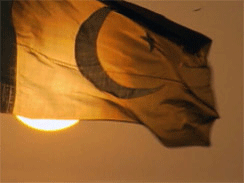 (AP) Indonesia’s constitutional court upheld a controversial blasphemy law Monday that critics say limits religious freedom in the world’s largest Muslim-majority country, ruling that the law is vital to religious harmony.
(AP) Indonesia’s constitutional court upheld a controversial blasphemy law Monday that critics say limits religious freedom in the world’s largest Muslim-majority country, ruling that the law is vital to religious harmony.
The 1965 law was challenged by a coalition of rights groups and civil society organizations who consider it discriminatory. But it is supported by religious conservatives, including the radical Islamic Defenders Front, which had gathered at the court and threatened to protest if the judges didn’t uphold it.
Although the law recognizes six official religions in the country — the standard forms of Islam, Catholicism, Protestantism, Buddhism, Hinduism and Confucianism — rights activists say it discriminates against minority religions, including Muslims whose beliefs differ from the mainstream.
The vast majority of Indonesia’s 235 million people are moderate Sunni Muslims.
Opponents say the law, which carries penalties of up to 5 years in jail and allows the government to ban groups that “distort” the official religions, should be struck down because it limits religious freedom — which is constitutionally protected in this secular country.
The court rejected those concerns in a 7-2 decision. The majority said the law was in place to protect all religions from desecration and to ensure religious harmony between faiths. They said the law did not bar other religions such as Judaism from being practiced, but simply protected those covered by the law.
“The law should be upheld because if it is annulled … Islam and the Quran could be interpreted at will and people and figures could declare new prophets and establish new religions,” Minister of Religious Affairs Suryadharma Ali said ahead of the ruling.
Critics say the law is vague, allowing authorities to interpret and enforce it how they choose. It has largely been used against those seen as offending mainstream Islam.
They also say hard-line Islamic groups have used the law as justification for violent attacks on minority religious groups.
The government has used the blasphemy law in the past to outlaw religious groups, including Ahmadiyah, a minority Islamic sect banned in 2008 whose members identify themselves as Muslims but don’t believe in the core tenet of Islam that Muhammad is the last prophet.
The dissenting judges called the law weak, saying it could be interpreted in multiple ways that lead to discrimination. They said the law was written during a revolutionary era when Indonesia’s authoritarian rulers were worried about social unrest and that the law wasn’t needed in modern Indonesia.
“The judges closed their eyes and hearts,” said Chairul Annam, one of the lawyers arguing for the law’s repeal. “We are very sorry that discrimination suffered by minorities in this country was not recognized by the court.”
Some worried that if the law was overturned, religious radicals would react with violence. The Islamic Defenders Front has a long history of vandalizing nightspots, hurling stones at Western embassies, and torching buildings belonging to rival groups or sects it considers heretical. Members of the group were accused of assaulting lawyers seeking the law’s repeal at an earlier hearing.
Hundreds of Indonesian riot police had been deployed around the court ahead of the verdict, but there was no unrest.
Source: www.cbsnews.com




